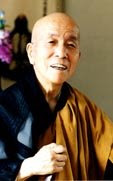Difference between Buddhism and AT theory (2)
After I received Mike Cross's first email about Buddhism and AT theory, I received his second email on the same subject, and so I would like to describe my opinion to the second email too.
Dear Sensei,
In short, the problem is this:
You describe that, when you notice that you are thinking something in Zazen, you bring your consciousness back to the state that you call "balance of the autonomic nervous system."
Yes, it is true. When I notice that I am thinking something while I am practicing Zazen, I usually regulate my sitting posture, for example, I make my efforts to keep my lower spine
straight vertically, stretch the backbone and the neck as far as possible, pulling the chin a little backward and downward, and pulling up the head toward the ceiling. And relying upon such a efforts, I regulate my posture in the authentic form to throw away consideration and perception.
You identify dhyana with the original state to which you wish to come back -- i.e. in your words, "balance of the autonomic nervous system."
I think that dhyana is the name of practice, and so it is different from the state of practice. Therefore when I want to describe the state of the practice, I usually use the word samadhi.
But true meaning of dhyana, within your own description, if we follow the literal meaning of the word as per the MW dictionary (=meditation/thought), is not our original state. Dhyana is rather the effort to "bring consciousness back," i.e. the effort to re-direct consciousness.
I wonder whether your interpretation is true, or not. Because I think that dhyana is the name of the practice, and so it might be doubtful for the word to indicate "bring consciousness back", or "the effort to re-direct consciousness."
This effort also is a kind of thinking. Therefore Master Dogen instructed us: Think that state beyond thinking.
Mike Cross
Therefore I wonder whether your supposition is true, or not.
With best wishes Gudo Wafu Nishijima
Dear Sensei,
In short, the problem is this:
You describe that, when you notice that you are thinking something in Zazen, you bring your consciousness back to the state that you call "balance of the autonomic nervous system."
Yes, it is true. When I notice that I am thinking something while I am practicing Zazen, I usually regulate my sitting posture, for example, I make my efforts to keep my lower spine
straight vertically, stretch the backbone and the neck as far as possible, pulling the chin a little backward and downward, and pulling up the head toward the ceiling. And relying upon such a efforts, I regulate my posture in the authentic form to throw away consideration and perception.
You identify dhyana with the original state to which you wish to come back -- i.e. in your words, "balance of the autonomic nervous system."
I think that dhyana is the name of practice, and so it is different from the state of practice. Therefore when I want to describe the state of the practice, I usually use the word samadhi.
But true meaning of dhyana, within your own description, if we follow the literal meaning of the word as per the MW dictionary (=meditation/thought), is not our original state. Dhyana is rather the effort to "bring consciousness back," i.e. the effort to re-direct consciousness.
I wonder whether your interpretation is true, or not. Because I think that dhyana is the name of the practice, and so it might be doubtful for the word to indicate "bring consciousness back", or "the effort to re-direct consciousness."
This effort also is a kind of thinking. Therefore Master Dogen instructed us: Think that state beyond thinking.
Mike Cross
Therefore I wonder whether your supposition is true, or not.
With best wishes Gudo Wafu Nishijima



0 Comments:
Post a Comment
<< Home